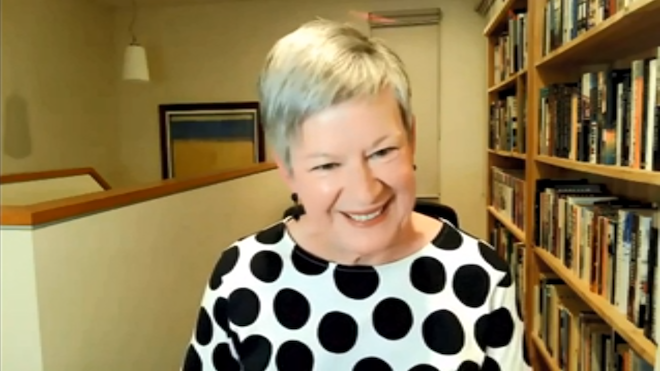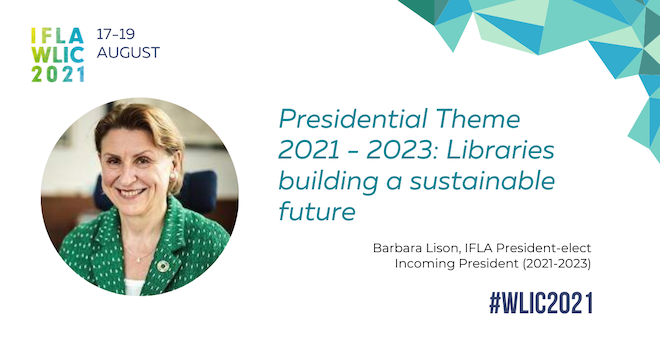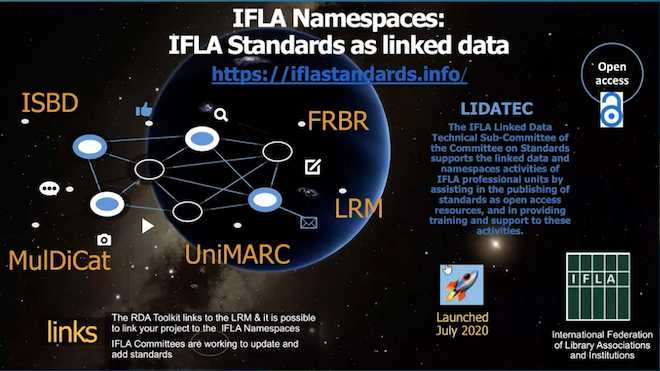IFLA: World Library and Information Congress- Day 3 Highlights!
WLIC 2021 closing session: the end of a beginning

IFLA President, Christine Mackenzie
After three dynamic days of sharing, learning, and creativity, IFLA President Christine Mackenzie closed our Federation’s first ever virtual World Library and Information Congress.
Setting out just a few of the highlights of IFLA’s first ever virtual WLIC, she urged participants to turn the connections they have made into lasting collaborations, delivering on the potential of a global library field. The closing session should in fact, therefore, be a starting point for new partnerships!
IFLA’s President-elect, Barbara Lison, underlined this focus on the future, drawing on the trends identified as priorities by participants in the President-elect’s session – see below for more!
IFLA Secretary General Gerald Leitner went on to encourage the audience to ensure that they made full use of all they had learned and heard during the Congress in the weeks and months to come, turning ideas into actions. To deliver on the goal of a strong and united global library field powering literate, informed, and participatory societies, everyone had a role to play, using the IFLA Strategy 2019-24 as a framework and reference point.
Finally, Christine Mackenzie formally closed the Congress, thanking all those involved – volunteers, participants, partners and headquarters staff – for their essential contributions to making a success of WLIC.
See you at our WLIC 2022 in Dublin!
Libraries building a sustainable future: WLIC 2021 President-elect’s session

When you are building something – a house, a town, or anything else – the first step is a surveyor’s report, to understand the situation today, and the possibilities and risks that must be considered. The same goes for building a sustainable future for our communities and profession!
With IFLA’s President-elect Barbara Lison deciding to focus her presidency on this theme – libraries building a sustainable future – the President-elect’s session this year offered an opportunity to do just this, prioritising the trends we will need to consider.
And who better to identify these trends than the people who will be at the head of the future library field – our emerging leaders?
In a dynamic session, supported by Kay Raseroka, Andreas Mittrowann, Heba Ismail, Rashidah Bolhassan and Gerald Leitner, Barbara worked with participants to find the top five trends from a list of twenty.
New public library world champion named!It all started in 1785 with an endowment of 6,000 books. Today, Deichman Bjørvika in Oslo, Norway, has been named as the world’s best new public library! The IFLA/Systematic Public Library of the Year award is presented annually by IFLA in collaboration with the Danish software company Systematic A/S, which also sponsors the award with a USD 5,000 prize. The award celebrates new public libraries. This year, 32 libraries competed for the award, five were shortlisted and the winner, Deichman Bjørvika was today presented with the award by IFLA President Christine Mackenzie. |
 |
IFLA Standards in the context of a changing information society

Over the last fifty years, IFLA has produced a wide range of standards that cut across all fields of library and information services. IFLA Standards are internationally reviewed, published and regularly updated publications and each IFLA Standard reflects current consensus on rules, principles, guidelines, best practice or models for a particular activity or service.
IFLA Standards are meant to have a lasting impact, but longevity in this case requires adaptation to an ever-changing digital environment. To this end, IFLA’s Key Initiative 2.3 outlines the integral role of “develop[ing] standards, guidelines and other documents that allow all types of libraries, everywhere, to improve practice and adapt to a changing world, keep up with and adopt new technologies, to meet user expectations.”
Libraries supporting a human response to anthropogenic climate change

Andrew Potts Founder, Climate Heritage Network
The sight of burnt or flooded libraries is a painful reminder of the vulnerability of our heritage to climate change, and the vital importance of action to protect it.
Yet as set out by Andrew Potts, founder of the Climate Heritage Network in his keynote speech for the libraries sustain track of WLIC, cultural institutions such as libraries do not just need to be victims – we can also be vectors of change!
With it recognised that the roots of the climate crisis lie in the attitudes and behaviour of people towards the environment, any efforts to mitigate and adapt to climate change will need to take account of cultural factors.
Libraries have enormous potential to contribute, through their collections, their ability to reach communities, their power as an example of climate friendly practices and techniques.
Check out the recording of the session – and those of other sessions in the libraries sustain track – for suggestions about what you can do!
